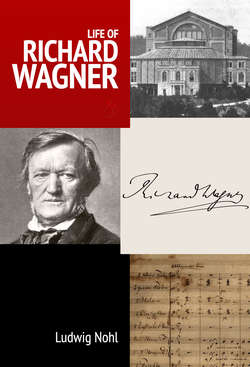Читать книгу Life of Richard Wagner - Louis Nohl - Страница 7
II 1832-1841 STORM AND STRESS
ОглавлениеIn Vienna—His Symphony Performed—Modern Ideas—“The Fairies,”—“Das Liebesverbot”—Becomes Kapellmeister—Mina Planer—Hard Times—Experiences and Studies—“Rienzi”—Paris—First Disappointments—A Faust Overture—Revival of the German Genius—Struggle for Existence—“The Flying Dutchman”—Historical Studies—Returning to Germany.
The God who in my breast resides,
He cannot change external forces.
—Goethe.
Beethoven’s life has acquainted us with the pre-eminence of Vienna as a musical centre. In the summer of 1832 Wagner visited the city, but found himself greatly disappointed as he heard on all sides nothing but “Zampa,” and the potpourris of Strauss. He was not to see the imperial city again until late in life and as the master, crowned with fame. In music and the opera Paris had the precedence. The Conservatory in Prague however performed his symphony, though right here he was destined to feel that the reign of his beloved Beethoven had but scarcely begun.
In the succeeding winter the same symphony was performed in Leipzig. “There is a resistless and audacious energy in the thoughts, a stormy bold progression, and yet withal a maidenly artlessness in the expression of the main motives that lead me to hope for much from the composer;” so wrote Laube, with whom Wagner had shortly before become acquainted. Here again we recognize the stormy, restless activity of the time, which thenceforth did not cease, and brought about the unity of the nation and of art. The ideas which prevailed among the students’ clubs, the theories of St. Simon and would-be reformers generally had captivated the young artist’s mind. In the “Young Europe,” Laube advocated the liberal thoughts of the new century, the intoxication of love, and all the pleasures of material life. Wagner’s head was full of them and Heine’s writings and the sensual “Ardinghello” of Heinse helped to intensify them.
For a time however his better nature retained the mastery. Beethoven and Weber remained his good genii. In 1833 he composed an opera, “The Fairies,” modelled after their works, the text of which displayed the earnest tendency of his nature. A fairy falls in love with a mortal but can acquire human life only on condition that her lover shall not lose faith and desert her, however wicked and cruel she may appear. She transforms herself into a stone from which condition the yearning songs of her lover release her. It is a characteristic feature of Wagner’s ideal conception of love that the lover then is admitted to the perpetual joys of the fairy world, as a reward for his faith in the object of his love. The work was never performed. Bellini, Adam, and their associates controlled the stage in Germany, and he was greatly disappointed. That grand artiste, Schroeder-Devrient, who afterwards was to become so essential to Wagner, had achieved unusual success in these light operas, especially in the role of Romeo. He observed this and comparing the sparkling music of these French and Italians with the German Kapellmeister-music which was then coming into vogue, it seemed indeed tedious and tormenting. Why should not he then, this youth of twenty-one, ready for any deed and every pleasure, earnestly longing for success, enter upon the same course? Beethoven appeared to him as the keystone of a great epoch to be followed by something new and different. The fruit of this restless seething struggle was “Das Liebesverbot oder die Novize von Palermo,” his first opera which reached a performance.
The material was taken from Shakspeare’s “Measure for Measure,” not however without making its earnestness conform to the ideas of “Young Europe,” and leaving the victory to sensualism. Isabella, the novice, begs of the puritanical governor her brother’s life, who has forfeited it through some love affair. The governor agrees to grant the pardon, on condition that she shall yield to his desires. A carnival occurs, and, as in “Masaniello,” a young man who loves the maiden, incites a revolution, exposes the governor, and receives Isabella’s
